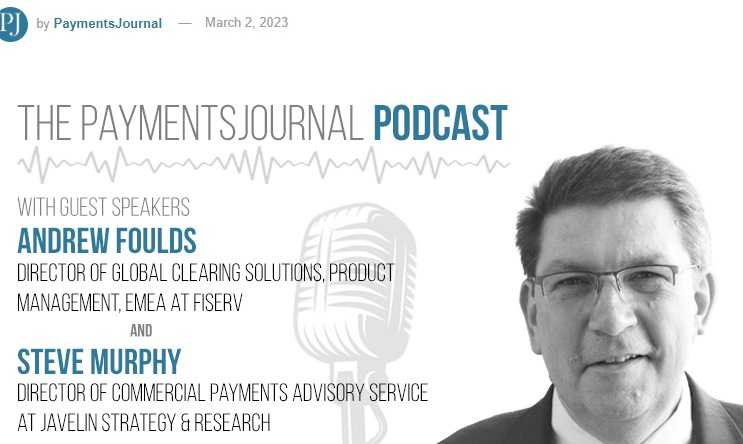ISO 20022 may be delayed in its global rollout, but that doesn’t mean banks can afford to put off or ignore upgrading their payments systems to meet this new messaging standard.
Broadly speaking, ISO 20022 is a global standard for electronic messaging between financial institutions and was initially created to give the financial industry a common platform for sending and receiving data about payments.
This new standard will provide much more granular and robust data about payments, which financial institutions can use to ultimately serve their clients better. Around 21 domains of business processes are specified in the ISO 20022 standard, along with the messaging and data necessary to support the different processes.
PaymentsJournal sat with Andrew Foulds, Director of Global Clearing Solutions, Product Management, EMEA at Fiserv, and Steve Murphy, Director of Commercial and Enterprise Payments Service at Javelin Strategy & Research to discuss the current state of ISO 20022 and what to expect. In Part 1, they chat about the importance of ISO 20022 for financial institutions, why it was delayed, and what banks can anticipate around this standard going forward.
ISO 20022 was meant to go live globally in November 2022 but got pushed back to March 2023. A big reason was the need for some market infrastructure platforms to iron out technical kinks. Notably, the European Central Bank (ECB) delayed the migration to its Target2 real-time gross settlement system, which would incorporate ISO 20022 standards, which in turn had a “domino effect,” explained Foulds.
“It caused other market infrastructure systems to delay their go-live dates,” added Foulds.
Swift, the global financial messaging network, also announced it will go live with ISO 20022 in March of 2023, but said that institutions will have until 2025 to adopt the new standard.
This may have lulled some financial institutions “into a false sense of security,” said Foulds, but it doesn’t mean that banks should be complacent in migrating to ISO 20022 standards.
“It’s something we are going to have to deal with as an industry,” he said.
Murphy added that U.S. institutions are not impervious to ISO 20022 standards, since the Federal Reserve will be adopting ISO 20022 standards for messages in its Fedwire Funds service, as well as The Clearing House for its CHIPS network.
The Clearing House noted that it “remains committed to the ISO 20022 message format to enhance the efficiency of payments processing, to allow participants and end user customers to glean value from enriched data content and structured message formats,” and added that approximately 95% of CHIPS payments have a cross-border component to them.
“There are global implications to this any way you look at it,” Murphy observed.
Opportunity Cost for Banks
Murphy asked Foulds how banks should be preparing for this massive change and if they should rely on their payments service providers to help with the transition or use in-house resources.
Foulds responded that larger banks likely have the in-house resources to begin working on migrating to ISO 20022 standards, and they are generally being more proactive in getting it done as quickly and as comprehensively as possible since much of their business is done globally.
Smaller banks will likely have to rely more heavily on help from their payments providers and vendors, but no matter the size of the institution, Foulds warned that none should put off the work to move to the new messaging standard.
“Since Swift gave until 2025 [for its institutions to adopt the new standards], some smaller institutions may put this off,” he added. “Our recommendation is that you should engage with your service providers and have a strategy to deal with this.”
That’s because there is an “opportunity cost” associated with delaying migration to ISO 20022 messaging standards, Foulds said.
“The earlier you go about this, the better it is, we think,” he added. “Don’t think about this as a mandated, regulatory issue, but view it as a business opportunity. There are more robust, rich data points transported via ISO 20022 messages, and institutions can use that new data and turn that information into new services for their clients.”
By way of metaphor, Foulds compared previous data sent through payments messaging as “about the size of a baseball, or a cricket ball” while data sent via ISO 20022 messages would be akin to the size of a basketball.
“There is a vast difference in the amount of data,” he added.
Foulds said this means that institutions that do not incorporate ISO 20022 standards will be at a massive competitive disadvantage. For example, when the European Central Bank’s aforementioned Target2 system goes live in March, it will be a “big bang” approach rather than a phased approach.
“That means on Friday at the end of day they’ll retire the old system, and Monday morning the new will be in place. So if you’re not ready, you won’t be able to do business. It’s really more of an existential business issue than just a regulatory issue.”
FLIP THE SWITCH...











 All while Pfizer—a company with a $2.3 billion criminal fine for fraudulent marketing, bribery, and kickbacks—was given blanket immunity from liability and billions in taxpayer dollars to produce a vaccine in record time with no long-term safety data.
All while Pfizer—a company with a $2.3 billion criminal fine for fraudulent marketing, bribery, and kickbacks—was given blanket immunity from liability and billions in taxpayer dollars to produce a vaccine in record time with no long-term safety data.
























